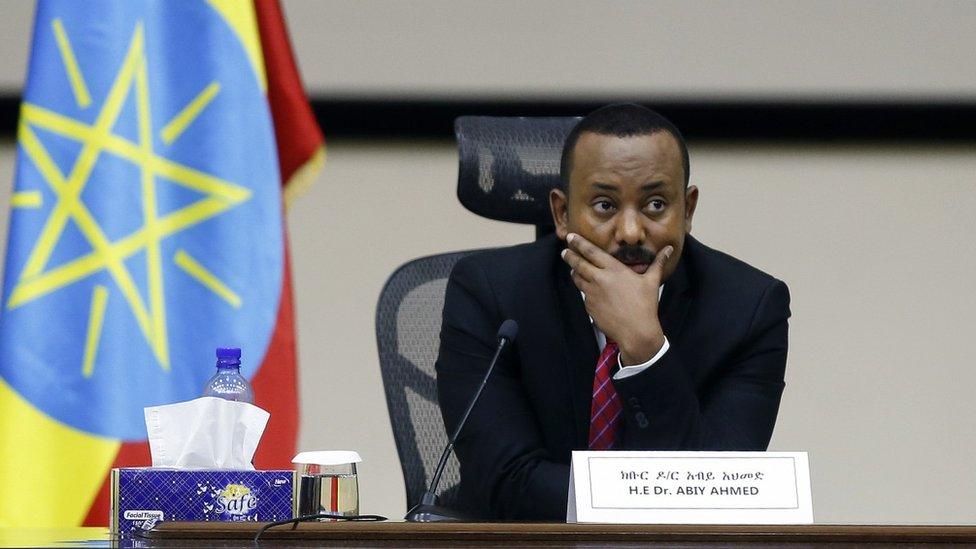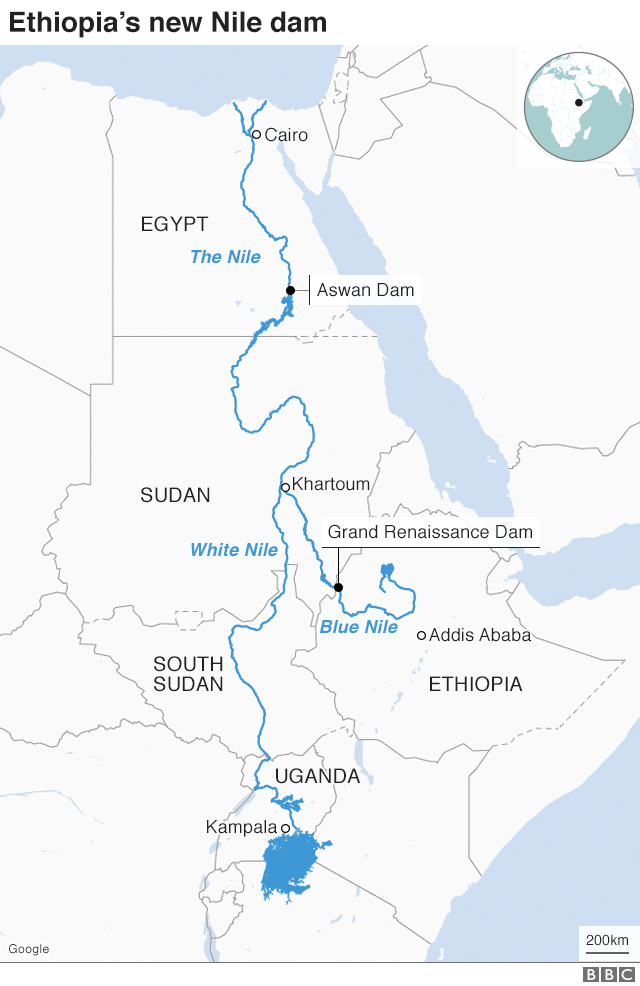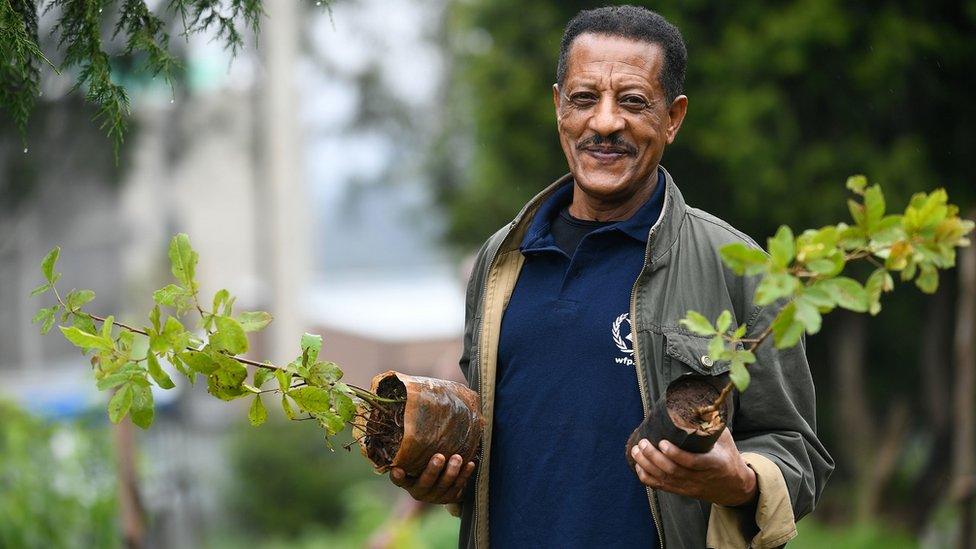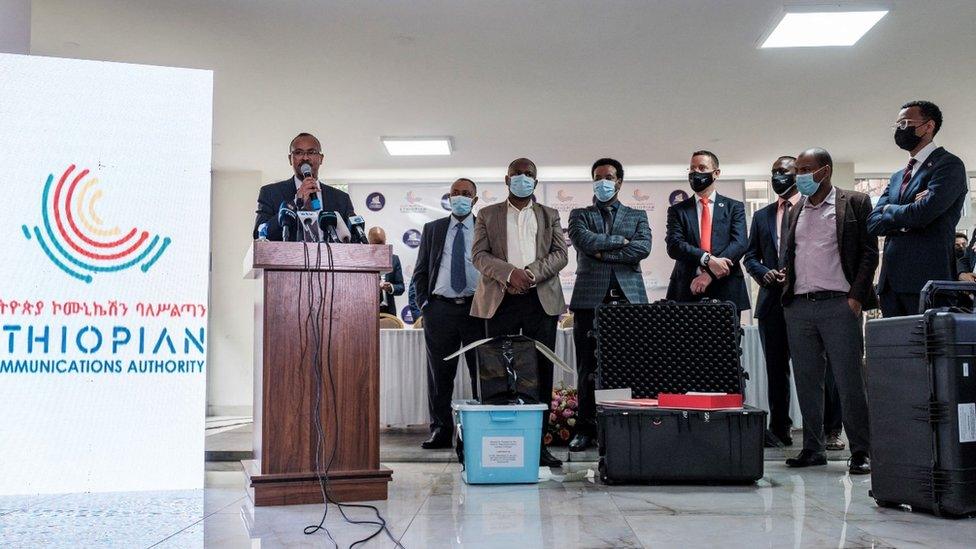Ethiopian elections 2021: Fact-checking Abiy's record
- Published

Ethiopian Prime Minister Abiy Ahmed
Since Ethiopian Prime Minister Abiy Ahmed assumed office in 2018, he has been praised as a peacemaker and economic reformer in a country which had been known for repression and extreme poverty.
Mr Abiy won the Nobel Peace Prize for his efforts to resolve the border conflict with Eritrea in 2019, but has since been criticised for his government's actions in the conflict in the northern Tigray region, and for not sticking to his reform programme.
He faces his first major electoral test in the forthcoming Ethiopian general election, currently planned for 21 June.
We have looked at some of his main claims during the campaign so far.
'About 45,000 detainees have been released'
Human rights organisations have long criticised Ethiopia for the detention of government opponents.
During Mr Abiy's initial year as prime minister, he was praised for freeing political prisoners.
Fisseha Tekle, a researcher at Amnesty International, said the exact number of those released was not available, but it could be in the region of 45,000.
However, many other people have been detained during Mr Abiy's term of office.
Human rights organisations have documented evidence of thousands of arrests., external
"Evidence collected by Amnesty International in Tolay [military camp], shows that at least 10,000 people were detained there in rounds of mass detention that started in January 2019, and continued to September 2019," said Amnesty.
"Similarly, former detainees at Sanqale [police training centre] estimated the detainees there to be at least 2,000."
In 2020, the state-run Ethiopian Human Rights Commission reported 9,000 people had been detained, external following outbreaks of violence after the killing of Oromo singer Hachalu Hundessa.
"The release of thousands of political detainees in the last months of the [previous] administration and initial months of Mr Abiy's time in office were ground-breaking, but the lull was brief," says Laetitia Bader, from non-governmental organisation Human Rights Watch.
"From mid-2019, following an alleged attempted coup in the Amhara region, the government started to arrest political opponents.
"This trend increased significantly from 2020, with the widespread arrests of supporters, family members and political opposition figures, journalists, and artists."
'A dam has prevented severe flooding in Sudan"
The Grand Ethiopian Renaissance Dam (GERD) straddles the Blue Nile river on Ethiopia's north-western border with Sudan.
It has been hailed by the Ethiopian government as playing a vital role in the country's development, providing large amounts of hydropower.
However, it has proved highly controversial and has led to tensions with nearby countries, especially Egypt.

One of the benefits of the project claimed by the Ethiopian government is that it prevents flooding downstream as it flows into Sudan.
However, last year, following the initial filling of the dam reservoir in July, the river downstream did flood.
"The floods in Sudan happened in August to September 2020. During that time, the GERD had no interference with the river flow or floods in Sudan," says Mohammed Basheer, a researcher at the University of Manchester.
Water levels did initially drop in Sudan as the reservoir was filling up, but once the dam reached capacity, the river rose to its natural level again.
Sudan has generally been supportive of the project, but "the future impact of GERD on floods in Sudan depends on how the dam will be operated, and the level of co-ordination with Sudan," says Mr Basheer.
'We will plant 20 billion seedlings in four years'
This "Green Legacy" flagship pledge made by the prime minister in 2018 required five billion seedlings to be planted every year until 2022.
In 2019, in the June to September planting season, the government says more than four billion seedlings were planted nationally, including 353 million in one single day.
In 2020, the claim was five billion and this year the goal is six billion. By the government's own reckoning, a further five million would need to be planted next year to reach its goal.

Ethiopia says nine billion trees have been planted in two years
These are phenomenally ambitious targets and very difficult to verify,
For the 2019 planting season, BBC Reality Check took a close look at what had been achieved and found that the evidence was limited.
The only planting figures available are those provided by the Ethiopian government and are not possible to independently verify.
There is also the challenge of survival of the planted seedlings.
Experts estimate that only about 30% of the seedlings planted in the previous years survived, while in 2020 Mr Abiy said there was a survival rate of 84% in those sown in 2019.
'We will liberate the telecoms sector'
Ethiopia's sale of two telecom licences, billed by the government as the "deal of the century", has been delayed, dealing a blow to the economic reforms championed by Mr Abiy.
His government announced the decision to liberalise the telecommunication sector in 2018.
State-owned Ethio Telecom has been a monopoly, but Mr Abiy said it faced several issues including lack of capital and expertise.
The plan by the government was to sell two licences to new telecom operators and also sell a stake in Ethio Telecom.

Balcha Reba, director general of the Ethiopian Communications Authority, led reforms in the telecom sector
However, an April deadline for selling a stake in Ethio Telecom has been missed.
Then in May, a bid for one of the licences by MTN International was rejected, although the second licence has now been awarded to a consortium called Global Partnership for Ethiopia.
Brook Taye, a senior adviser at the finance ministry, told Reuters the delays were because liberalising the industry had required complex new laws.
Other state-owned corporations lined up for privatisation included Ethiopian Airlines, but that plan was dropped last year.
